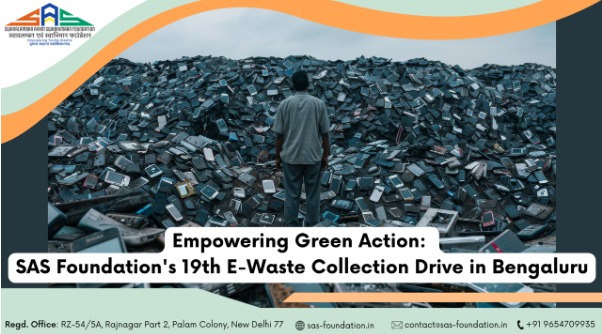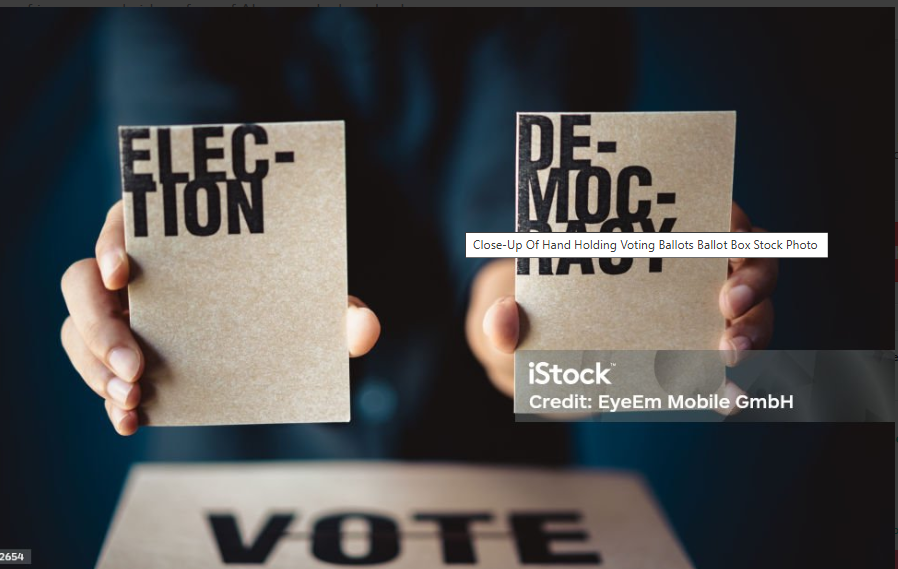♻️ Reducing E-Waste: Everyday Actions That Protect Our Planet
In a world powered by gadgets and technology, the dark side of innovation is quietly mounting — electronic waste (e-waste). From outdated smartphones to broken laptops and discarded chargers, the pile of unused and unrecycled electronics is growing exponentially. But the good news is, as conscious consumers, you have the power to change this trajectory.
E-waste isn’t just about clutter. It’s a pressing environmental challenge, a resource management issue, and a social responsibility. According to a UN report, over 50 million tonnes of e-waste are generated globally each year — and only 17.4% is formally collected and recycled. The rest often ends up in landfills or informal recycling units, causing serious harm to the environment and human health.
At Swavalamban Avam Swabhimaan Foundation (SAS Foundation), we’re working to raise awareness, promote responsible recycling, and empower individuals with the knowledge and tools needed to reduce e-waste. In this article, we break down simple yet impactful actions that each of us can take to be part of the solution.
🌍 Why E-Waste is a Problem We Can’t Ignore
🧪 1. Environmental Pollution
E-waste contains toxic elements like lead, mercury, cadmium, and flame retardants. When dumped irresponsibly, these leach into the soil and water, polluting ecosystems and entering our food chain.
🔥 2. Air Quality and Informal Recycling
Many informal recyclers burn electronics to extract metals like copper and gold, releasing toxic fumes into the air. This not only affects local air quality but also poses health risks to unprotected workers, including children.
💸 3. Resource Wastage
Modern electronics are packed with valuable materials — copper, gold, aluminum, rare earth elements — all of which can be recovered and reused. Improper disposal wastes these finite resources and increases the demand for environmentally destructive mining.
💡 What Can You Do? 5 Smart Habits to Reduce E-Waste
Tackling e-waste doesn’t require massive change overnight. It begins with small, everyday decisions. Here are five impactful strategies:
🔹 1. Educate Yourself: Understand the Impact
Awareness is the first step. Learn about:
- What qualifies as e-waste (hint: it’s not just phones and laptops — it’s also cables, headphones, routers, and kitchen electronics!)
- The dangers of improper disposal
- The benefits of certified recycling
Start conversations in your family, school, or workplace. Host workshops or awareness sessions in your community with the help of NGOs like SAS Foundation.
🔹 2. Smart Purchasing: Buy Less, Choose Better
Think quality over quantity. Ask yourself:
- Do I really need a new device?
- Can I repair or upgrade instead of replacing?
- Is there a certified refurbished alternative?
Opt for electronics from brands that follow green manufacturing practices and offer buyback or recycling programs. Fewer purchases = less waste.
🔹 3. Extend Device Lifespan: Repair, Don’t Replace
A little care goes a long way.
- Use protective cases, screen guards, and safe charging practices
- Clear storage regularly and uninstall unused apps
- Replace old batteries instead of discarding the whole device
When a gadget breaks, try repairing it at a certified service center instead of replacing it instantly. Encourage a fix-it-first culture in your home.
🔹 4. Dispose Properly: Use Certified Recyclers
Never toss electronics in your regular dustbin. Instead:
- Find authorized e-waste recyclers in your city
- Participate in collection drives, like those organized by SAS Foundation
- Ask local electronics stores or RWAs about drop-off points
SAS Foundation has organized 16+ e-waste drives across Indian cities like Delhi, Gurgaon, Noida, Faridabad, Bengaluru, and Mumbai — collecting over 2.2 tonnes of e-waste in a single year.
You can also organize a community drive in partnership with us to responsibly recycle unused electronics in bulk.
🔹 5. Donate or Repurpose
Just because a device is outdated for you doesn’t mean it’s useless.
- Donate functional laptops, smartphones, or tablets to NGOs, underprivileged students, or shelters
- Repurpose old gadgets — use an old smartphone as a security camera, or a tablet as a digital photo frame
Give your electronics a second life, and support digital inclusion at the same time.
🌱 The Role of Communities and Institutions
Beyond individual action, schools, companies, and local governments must play a key role:
- Educational institutions can integrate e-waste awareness into curricula
- Corporates can include responsible disposal in their CSR initiatives
- Housing societies can host regular drives and workshops
- Startups and innovators can create solutions for e-waste tracking and repurposing
SAS Foundation works across all these areas to promote Sustainable Development Goal 12: Responsible Consumption and Production.
👣 Start Small, Think Big
You don’t need to overhaul your lifestyle. Just start small:
- Recycle one old device this month
- Say no to impulse tech buys
- Share a post about e-waste awareness
- Ask your HR about starting a tech donation drive
Every step, no matter how small, adds up when millions of people take them.
💬 Hear from Our Changemakers
“I had no idea how dangerous it is to throw a broken charger in the bin. Thanks to the SAS Foundation’s session, I now keep a separate box for e-waste and have inspired my neighbors to do the same.”
— Anita Gupta, Gurgaon Resident
“My college participated in an e-waste collection challenge, and we collected over 30 kgs in a week. It felt amazing to contribute to a cleaner future!”
— Nikhil Sharma, Delhi University Student
📣 Ready to Join the Movement?
You can be part of the solution today. Here’s how:
✅ Organize an e-waste drive in your society or office
✅ Partner with SAS Foundation to educate and act
✅ Volunteer or become a local green ambassador
✅ Subscribe to our newsletter for eco-tips and impact stories
🔗 Subscribe on LinkedIn: https://lnkd.in/g7nPj4Zk
🌟 Together, We Can Drive Change
The e-waste problem is big — but so is our collective power to solve it. With every device you recycle, every conversation you start, and every action you take, you help move us closer to a circular economy and a cleaner planet.
Join us at SAS Foundation as we turn awareness into action.
Let’s create a future where technology and sustainability go hand in hand.










